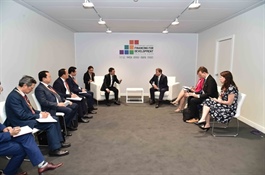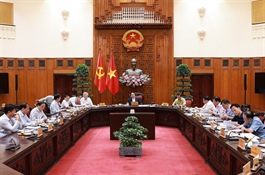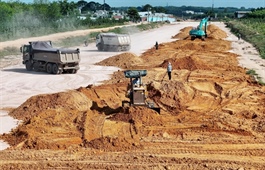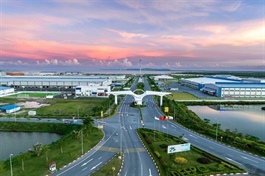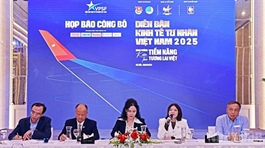Policy progress vital for FDI inflow gains
Policy progress vital for FDI inflow gains
As the US tariffs loom, Vietnam’s foreign investment landscape is entering a crucial juncture. Seck Yee Chung, partner at Baker McKenzie, discussed with VIR’s Thanh Van his insights into current trends and investors’ strategies to navigate the evolving landscape.
Could you shed some light on the investment flows in Vietnam so far this year?

Seck Yee Chung, partner at Baker McKenzie |
Investment inflows continue to grow despite global volatility, illustrating strong confidence in the country’s compelling investment environment and business opportunities.
This continued growth underscores the trust global firms place in Vietnam, driven by its solid production base, skilled and cost-competitive workforce, and dedication to global economic integration. Additionally, global companies are still relocating supply chains to Vietnam even as US negotiations and dialogue over tariffs and non-tariff barriers with China and Vietnam continues.
Vietnam’s extensive maritime links, proximity to major shipping routes, and expanding highway and railway networks provide it with a significant competitive advantage in logistics efficiency.
Despite worldwide uncertainties, the demand for consumer electronics, semiconductors, and various other goods remains strong, thereby bolstering foreign direct investment (FDI) in manufacturing.
What is the outlook of FDI flowing into Vietnam in the rest of 2025?
Looking ahead, despite the persistent global uncertainties in 2025, FDI inflows into Vietnam are anticipated to remain stable if policies and infrastructure continue to progress. Investment in high-value sectors such as semiconductor manufacturing, AI, digital transformation, logistics, etc., is projected to experience sustained growth.
Several critical factors are influencing international investor sentiment, including geopolitical conflicts, the policies of the US government, and the strategic responses of various economies, all of which remain unpredictable. Even though the US tariffs may cause short-term disruptions to FDI flows as investors reassess the risks, in the medium and long term, capital inflows are expected to stabilise and grow sustainably.
As Vietnam is in tariff negotiations with the US, which sectors will be less affected?
Ongoing US-Vietnam tariff negotiations indicate that certain sectors will experience minimal impact from new duties. High-tech and strategic products have been exempted from Washington’s 46 per cent countervailing tariffs. Vietnam’s steel and aluminium, already subject to regular US tariffs (increased to 50 per cent as of June 4), face no additional duty. Copper, gold, and other metals are also exempted.
Furthermore, pharmaceuticals, vaccines, semiconductors, and certain electronic components are spared in the current US tariff list. Energy, minerals, and essential raw materials such as oil, liquefied natural gas, ethane, and critical minerals are exempt to aid in stabilising US domestic production.
Furthermore, pharmaceuticals, vaccines, semiconductors, and certain electronic components are spared in the current US tariff list. Energy, minerals, and raw materials such as oil, liquefied natural gas, ethane, and critical minerals are exempt to aid in stabilising US domestic production.
Humanitarian and civil-use goods such as personal communication devices, aid goods, published materials, gifts, and tourism-related products are also exempted.
Overall, Vietnam’s electronics, medical/pharmaceutical, and energy sectors should experience much less tariff impact, while exporters of ordinary consumer goods, which are closely tied to the US market, remain the most at risk.

Policy progress vital for FDI inflow gains, photo Le Toan |
How do you see foreign investors will navigate tariff impact in these sectors?
To navigate these challenges, foreign investors in ordinary consumer goods sectors should consider the following strategies. First is to diversify export markets. A substantial portion of Vietnam’s exports in these sectors (for example, textiles, footwear, and furniture) is destined for the US market, making them highly susceptible to tariff changes and trade tensions.
By spreading investments in different regions and sectors, investors can shield their portfolios from volatility. Potential markets for exports includes Southeast Asian countries such as Thailand, Malaysia, and the Philippines, South America, and Islamic markets, especially those with growing economies and a need for Halal-certified products.
What are your recommendations for Vietnam to adjust the FDI attraction strategy?
Vietnam is actively reshaping its FDI strategy to attract high-quality, technology-driven, and sustainable projects. To further refine this strategy, firstly, Vietnam should continue enhancing its legal and regulatory framework to offer greater transparency and protection for investors to boost confidence. Secondly, investing in human capital through education and training programmes can ensure a skilled workforce ready to meet the demands of high-tech industries.
Furthermore, developing infrastructure, particularly in technology parks and special economic zones, can create a conducive environment for innovation and productivity.
Additionally, Vietnam should also leverage international cooperation to refine its FDI strategy by building strong diplomatic relations with key investment partners and participating in international trade agreements that promote investment.
Lastly, fostering an ecosystem for research and development by providing incentives and facilitating collaborations between academia and industry can propel Vietnam to the forefront of tech advancements.
- 10:24 02/07/2025







